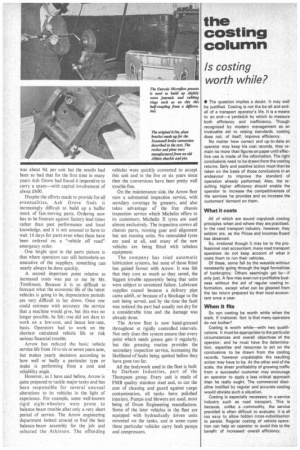the costing column
Page 34

If you've noticed an error in this article please click here to report it so we can fix it.
Is costing worth while?
• The question implies a doubt. It may well be justified. Costing is not the be-all and endall of a transport operator's life. It is a means to an end—a yardstick by which to measure both efficiency and inefficiency. Though recognized by modern management as an invaluable aid to raising standards, costing does not, of itself, improve efficiency.
No matter how correct and up-to-date an operator may keep his cost records, they remain no more than figures on paper until effective use is made of the information. The right conclusions need to be drawn from the costing returns. Early and positive action must then be taken on the basis of those conclusions in an endeavour to improve the standard of operation already performed. Also., the resulting higher efficiency should enable the operator to increase the competitiveness of the services he provides and so increase the customers demand on them.
What it costs
All of which are sound copybook costing principles when and where they are practised. In the road transport industry, however, they seldom are, as the Prices and Incomes Board has observed.
So, irrational though it may be to the professional cost accountant, many road transport operators do not keep account of what it costs them to run their vehicles.
Of these, some fall by the wayside without necessarily going through the legal formalities of bankruptcy. Others seemingly get by—if only just. A few may even run a profitable business without the aid of regular costing information, except what can be gleaned from the tax return prepared by their local accountant once a year.
When it fits
So can costing be worth while when the stark, if irrational, fact is that many operators do not bother?
Costing is worth while—with two qualifications. It must be appropriate to the particular circumstances and overall objectives of the operator; and he must have the determination, expertise and resources to act on the conclusions to be drawn from the costing records, however unpalatable the resulting action may have to be. At the other end of the scale, the sheer profitability of growing traffic from a • successful customer may encourage an operator to apply a less critical approach than he really ought. The commercial discipline instilled by regular and accurate costing would obviate such a situation.
Costing is especially necessary in a service industry such as road transport. This is because, unlike a . commodity. the service provided is often difficult to evaluate. It is all too easy to allow hidden cross-subsidisation to persist. Regular costing of vehicle operation can help an operator to avoid this to the benefit of increased overall efficiency.




















































































